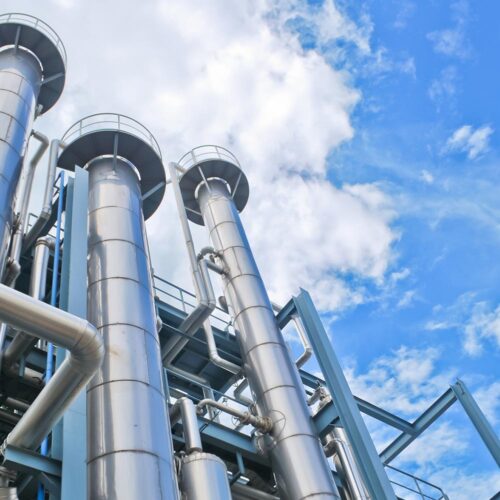
This article is part of a series. To learn more, please see our other articles in this series: How Hydrogen Could Clean Up the Chemicals Industry, From Waste to Value: How Carbon Dioxide Can Be Transformed into Modern Life’s Essential Products, and Thermal Batteries: Electrifying Heating in Chemical Plants.
Clean Energy 101: The Chemicals and Climate Connection
Chemicals are a part of our daily lives – with serious climate implications. RMI is working to reduce the climate risk.
Chemicals are an integral part of our daily lives, from the ingredients of our cleaning supplies to the building materials that make up our homes. While we interact with these products daily, their overall climate risk has largely gone unnoticed. Despite the efforts of industry leaders to reduce the chemicals sector’s emissions, there is still a complex decarbonization path ahead. This article aims to clarify the connection between chemicals and the climate and provide an overview of where RMI is advancing solutions to cut this industry’s carbon footprint.
The Hidden Climate Risks of Chemicals
The chemicals industry is a significant contributor to greenhouse gas emissions, accounting for 4 percent to 6 percent of global emissions. This is comparable to the emissions from the steel industry, which is often recognized as a high climate impact sector. The production and use of chemicals has a profound impact on the environment, and it is essential to understand the various stages of the supply chain where emissions occur.
The Everyday Presence of Chemicals
Chemicals are ubiquitous in our daily lives. They are used in the production of 96 percent of the manufactured goods we encounter every day. For example, ethylene, ammonia, propylene, and methanol are intermediate products used in various applications such as plastics, fertilizers, and adhesives. These chemicals are used in products like PVC pipes that deliver clean water and medical equipment that enables modern healthcare. Chemicals will also play a critical role in the clean energy transition. Notably, the chemicals sector underpins more than 75 percent of emission reduction technologies, including critical components like ethylene vinyl acetate in solar panels and refrigerants in heat pumps. However, these chemicals’ production has significant climate implications due to the volume at which they need to be produced and the use of fossil fuel feedstocks and energy inputs.
The Complexity of Decarbonizing the Chemicals Industry
Cutting climate pollution from the chemicals industry is a complex challenge. RMI is taking a systems approach to solutions. We are examining everything from how these products are made to what advanced recycling or circular economy solutions could look like, to how markets can drive demand for low-emissions products. The industry’s decarbonization requires careful thought and planning, as well as custom-tailored solutions that consider the entire supply chain.
The emissions in the chemicals industry supply chain occur at various stages, including production, use, and disposal. The production process itself is energy-intensive, relying heavily on fossil fuels. The current production volumes are significant, and they are expected to increase by 2050. Furthermore, the lack of recycling and repurposing infrastructure has contributed to the climate problem. The industry’s complexity arises from the interconnected nature of the supply chain, requiring solutions that address each stage of the process.
Solutions for a Low-Carbon Chemicals Industry
RMI is focused on advancing several solutions to reduce the climate impact of the chemicals industry:
- Reducing Demand: Reducing overall demand for petrochemicals can also help mitigate the climate impact. This can be achieved through strategies like embracing circular economy principles for reuse and recycling, aided by emerging demand-side policies.
- Process & Energy Efficiency: Reducing the energy required to manufacture chemicals, as well as replacing the fossil fuels used as heat in chemicals production processes with renewables and hydrogen can significantly reduce emissions. Process and supply chain improvements like mitigation of upstream methane emissions can also significantly reduce the overall emissions intensity of chemicals.
- Defossilized Chemical Industry: Using alternative feedstocks and production pathways with lower emissions can reduce the industry’s reliance on fossil fuels.
The Urgency of Action
The chemicals industry is one of the most complicated sectors to decarbonize. If we do not invest time and money investigating and defining the best paths forward now, we risk falling behind and allowing less optimal options to prevail. Incumbents may continue to dominate the industry, investing heavily in current fossil fuel feedstocks and carbon capture and storage (CCS) rather than alternative renewable-sourced feedstocks and systems. It is crucial that we focus on these solutions now to ensure a low-carbon future.
What to Expect Next from RMI
RMI is advancing solutions for the chemicals industry through deeper analysis and recommendations — examining the entire supply chain, from production to disposal, and identifying opportunities for reduction and mitigation. Indeed, to date, we have already laid out a pathway and solutions in several supply chains. By working together, we can reduce the climate risk associated with the chemicals industry and create a more sustainable future for the industry. Stay tuned for additional insights on the best paths forward for this sector.

